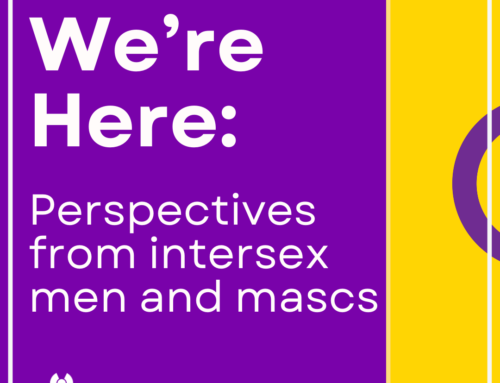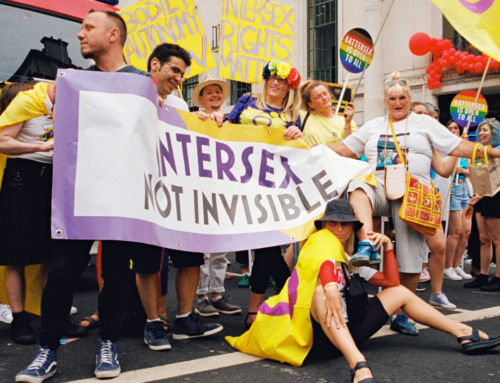“Hold on honey,” I imagine myself saying to one of my daughters as I veer from a stream of hurried travelers at the crowded Dallas airport and head toward a desperately needed women’s restroom after a long flight from Boston. “Stay here with daddy for a few minutes while mommy uses the restroom, be right back.”
Then I see an official looking sign posted outside the entrance of the bathroom, “This restroom is not open to individuals age 13 years or older unless their gender matches their gender established at their birth, or matches their chromosomes. Illegal use of this facility is a Class A misdemeanor under Texas Law punishable by up to one year in jail and a maximum $4,000 fine.” Wow.
What should I do? I am intersex. I have XY chromosomes, female-typical genitals, and testes in my abdomen rather than ovaries and uterus. I look female and have always identified as female. But this sign says I am not allowed to use a public restroom because my chromosomes don’t match my gender.
And clearly this sign says a transgender woman, someone who was assigned male at birth, but identifies and lives as a woman, is not permitted to use this bathroom either.
Is someone going to ask me for my birth certificate or blood test results when I go in there? Does Texas have bathroom police?
“Back already mom?’ my daughter quips.” To which I reply, “ yup, and now I really have to go. Texas has gone down the toilet.”
Until recently I had never (knowingly) met a transgender person. I was like many other cisgender, heterosexual women in our society enjoying the unspoken privilege of being typical, expected, and accepted. I went to college, got married to a wonderful man and have two beautiful children.
Then I discovered at age 40 after seeing my childhood medical records, that I am “intersex”. Meaning I am the 1 in every 2000 who are born with a mix of physical characteristic that don’t align with the typical definition of either “male” or “female”. Since this personal discovery my mind has opened wide to the reality that we live in a non-binary world. Sex is not just “male” or “female”. There is a tremendous amount of natural variation in between.
And sex and gender are two different things. It sounds so basic, but the majority of people I talk to about this (outside of my community of LGBTQI friends) are simply unaware of this factual reality. As a society we have been so indoctrinated with the simple but erroneous idea that there are just two sexes in this world: male and female. Many believe that sex and gender is the same thing. To many people, that is a deep foundational belief that is hard to change.
And with good reason. Most of us are taught from a very early age to think in a binary way about sex. Boys and girls, blue and pink. There is very little space for other colors. Or for girls who like blue and boys who prefer pink. But it’s simply a medical fact that chromosomes are not determinative of a person’s sex or gender.
Recently I learned about several bills filed in state legislatures with the intent to discriminate against transgender people. These “bathroom bills” seem to be cropping up in reaction to a growing awareness and presence of the transgender community in the United States. They are a hateful attempt to squash the progress and growing confidence of a marginalized community who is only now beginning to receive the recognition and respect they deserve.
One such attempt is encompassed in two bills filed in Texas by Rep. Debbie Riddle making it a crime for transgender (and many intersex) people to use a public bathroom.
HB 1748 would make it a Class A misdemeanor for any person 13 years or older to use a restroom that does not match the gender established at the individual’s birth or by the individual’s chromosomes. (That’s me) This act would be punishable by up to one year in jail and up to a $4,000 fine.
A companion bill, HB 1747, would make it a crime of disorderly conduct for transgender people to enter public restrooms without ID such as a driver’s license that matches their gender identity.
Why on earth would the good people of Texas (or any state) support such blatantly discriminatory and hateful (not to mention absurd) legislation? Fear.
Fear of what they don’t understand. Ignorance and fear have long been causes for hatred and discrimination of all kinds. I read arguments from proponents of these types of “bathroom bills” that most often focus on safety concerns for their wives, daughters, sisters and mothers who use public restrooms. What is it, exactly, that these protective and caring proponents are protecting women from? Transgender women have to pee too.
Come on, we know that this espoused “safety concern” for wives and daughters, sisters and mothers is nothing but a cover for an irrational fear of something they don’t understand. If these good citizens of Texas really and truly want to protect the women in their lives then they can speak up against domestic violence in their communities or support efforts to pass laws that protect transgender people – focus on real threats to women’s health and safety.
As an intersex woman, advocate, mother of two children and most importantly a human being, I support my brothers and sisters in the transgender and intersex communities in opposing HB1748
and HB 1747.







